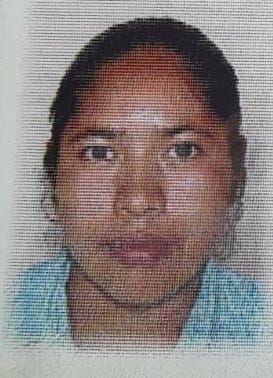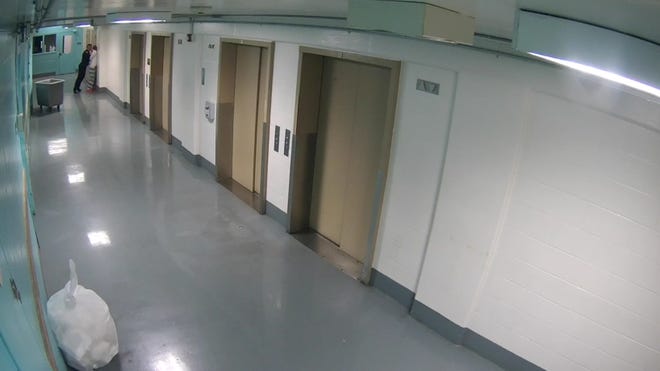
Carolina Ramirez Perez clambered into a car in the early morning hours of March 2, just south of the U.S.-Mexico border.
It was dark outside, packed inside. Nearly two dozen others crammed in with her. The seats had been ripped out, so the migrants perched on top of thick, black garbage bags that held their toothbrushes, clothing and documents to back up political asylum claims.
Fleeing domestic violence, the 32-year-old mother of four hoped to reunite with her children in Southern California later that day, according to court documents, a family member and relief officials who spoke with USA TODAY.
But she did not survive the trip.
Ramirez Perez was among the 13 killed after that packed SUV collided with a semi-truck near the U.S.-Mexico border last week, Yadira Robles of the Imperial County Coroner's Office confirmed to USA TODAY.
'Dark realities of our immigration struggle':Victims of deadly California crash should be focus of U.S. policy changes, leaders say

The La Mixteca, Mexico resident was leaving an abusive relationship and planned to join her three children living in the U.S., ages 2, 5 and 10, according to two members of a Los Angeles County nonprofit that aids and advocates for indigenous communities.Her 14-year-old lives with her grandmother in Mexico. Santa Barbara court documents show the alleged abuse went back as far as 2012.
"We really don't know what happened," said Odilia Romero, co-founder and executive director of the organization, Comunidades Indígenas en Liderazgo (CIELO). "All we know is that she was running for her life, and now she's dead."
Ramirez Perez's death has hit Romero hard because she sees people in similarly desperate circumstances regularly. Migrants wanting to get into the U.S. will pay human smugglers – known as "coyotes" – thousands to sneak them across the border.
"As we speak, people are being displaced and will want to cross the border to survive," Romero said. That "pushes people to pay coyotes, who are always going to be there. They will not stop."

'He was going to throw my body in the river'
Ramirez Perez "had a tragic life," Romero said. While she was still in her teens, Ramirez Perez' father pulled her out of school and married her against her will, Romero and a CIELO board member said. They crossed into the U.S. and worked in the fields of Santa Maria, a rich agricultural hub, as farmworkers, sending home money when they could to family who were taking care of their then-2-year-old daughter.
It was there that her husband, Martín Ruiz López, was charged with abusing her nearly a decade before she left him, Santa Barbara court records show. A 2019 statement obtained by USA TODAY says the abuse continued.
USA TODAY was not able to reach Ruiz López for comment via the municipal offices in the rural, mountainous region where he lives in Oaxaca or via an advocate who works with migrants in the area.
Ramirez Perez's son also confirmed the alleged abuse to the newspaper La Opinión.
After Ramirez Perez had her first child, she and her husband crossed the border into the U.S., CIELO board member Xiomara Corpeño said.
In 2012, Ruiz López was arrested and charged with spousal battery, criminal threat with intent to terrorize, and trying to prevent or dissuade a witness by threat, according to records from the Superior Court of California, County of Santa Barbara. He pleaded guilty to the last charge, and the other two charges were dismissed.
That year, Ramirez Perez obtained a criminal protective order for domestic violence against her husband from the Santa Maria Police Department. In 2013 he was sentenced to 180 days in confinement and five years probation. He served 77 days in the Santa Barbara County Jail.
He was deported to Mexico after serving his sentence and, once home, allegedly forced her to return as well, Corpeño and Romero said.
Fearful, Ramirez Perez agreed and went home to Mexico, Corpeño and Romero said. There, she suffered "physical and psychological abuse" at the hands of her husband, according to a statement Ramirez Perez made to Mexican authorities in 2019.
The abuse went on for years, she said in the statement.
In 2019, however, Ramirez Perez decided to leave Ruiz López. She made a statement to the Tecomaxlahuaca municipal attorney, obtained by USA TODAY, that detailed alleged ongoing abuse by her husband and cited it as reason for separation. In the statement, Ramirez Perez told authorities she had come home one evening to find him drunk, threatening her with a gun.
Dijo "que me iba a tirar al río y que nadie se iba a dar cuenta de mi paradero," she said in the statement. Translated In English, she said he told her that night he would shoot her and throw her body in the river, and that no one would ever know what had happened to her.
She left him then, she said in the statement. But she was still afraid.
'No one answered'
Although Ramirez Perez left Ruiz Lopez in 2019, she went back to him at least once, Corpeño said. In recent months, a relative – who requested not to be identified for fear of deportation and threats by Ramirez Perez's husband against his family – said Ramirez Perez had reached out to family in the U.S. for help leaving her husband once and for all.
He said she wanted to escape to the U.S., and to bring her children with her.
First, they petitioned organizations and lawyers for assistance in setting up an asylum claim, but were told that all she could do was sit tight and wait, said Cynthia Santiago, an L.A.-based immigration attorney Ramirez Perez's relatives have retained.
"For her, that wasn't possible based on the amount of danger she was in," Santiago said.
Like many women who endure domestic violence, Ramirez Perez wasn't allowed to work outside the home, so a relative loaned her money to pay a coyote – guides who take their name from the animals that expertly wind their way through desert. She used the funds to pay a man from her hometown to take her and her children to Tijuana, Mexico.
There, he connected them with a coyote who would smuggle them into the U.S. for a portion of the money paid to him. She paid $14,000 for the kids and $12,000 for herself, Corpeño said.
Ramirez Perez sent her three youngest across first and waited to find out that they were safe in family members' homes, Corpeño said.
Only then did Ramirez Perez make plans for herself to cross, Corpeño said, and hoped to reunite with her children in Southern California.
She did not live to see them again.
Ramirez Perez planned to get in a car around 3 a.m., her relative said, which would take her across the border. He expected to hear from her hours before dawn. Anxious, he checked in once, twice, three times. Each time the coyote said they would leave soon, and he would let him know when they had made it to the other side.
When he called her, she didn't pick up the phone, but she did send him a brief text message, the substance of which was: "We still haven't gotten in the car, but we're going to, soon." She didn't write again, even though he kept calling and texting.
By 8 a.m., he said, he was sure something was wrong. He could not reach her, nor the coyote ferrying her across. No one was picking up their phones.
He opened Google and saw that there had been a car crash –– he feared the worst. He told USA TODAY he immediately called the Mexican Consulate in Calexico, and it was then that he learned from officials that Ramirez Perez had died.

The deadly collision happened early Tuesday in the heart of California’s Imperial Valley, a major farming region, after two SUVs were seen on surveillance video driving through a 10-foot hole in the border fence, according to Customs and Border Protection. Officials said all the victims of the crash are suspected to have entered the country illegally, and the agency was investigating potential ties to human smuggling.
The car Ramirez Perez was in, a Ford Expedition carrying 25 people, was 10 miles north and 30 miles east of the border opening when it collided with a big rig, violently ejecting passengers and their belongings. The other SUV that crossed the border, a Chevrolet Suburban carrying 19 people, caught fire on a nearby interstate after entering the U.S., according to CBP.
Seventeen people in the car that crashed were Mexican, including 10 who died and seven who were injured, the Mexican Consulate in Calexico said. At least three were from Guatemala, the Guatemalan Consulate in Los Angeles said. No one riding in the Chevrolet died.
"She was so heroic in getting her kids to safety so they could have a better future," said Santiago, the attorney. "Unfortunately, she lost her life as a result. But she was just doing everything she could for them because she didn't want them to grow up in those conditions."
Ramirez Perez's relative said he doesn't know how to move forward. He hasn't even been able to tell her children she has died –– they are still waiting for her to come for them.
"No hemos sido capaz a decirlo a los niños. Todavía le esperan," the relative said. Pero "ellos también merecen esa verdad." In English, he said they hadn't been able to tell her children yet, but they deserve the truth.

Dwindling resources, violence and migration
Corpeño started a GoFundMe page to raise money to cover funeral costs and help feed and clothe Ramirez Perez's children, who are still in the U.S. One relative hopes to petition for legal guardianship of the children, and has retained Santiago to that end. He worries Ruiz López will claim the kids, otherwise.
"It's awful," Corpeño said, her voice breaking. "I don't think people can appreciate that it's not just new people coming over. It's people who've been here before, who are reunited with their family members. It's not just cut-and-dried crossing the border, it's so much more complicated."
Romero said the factors that push people into leaving their home behind and undertaking a dangerous crossing are varied and complicated, but indigenous communities like the one Ramirez Perez came from face additional pressures.
"The community they come from is one of the most impoverished states in the Mexican Republic," which can steep the residents' lives in violence, Romero said. "The communities from there are constantly migrating. I think the root cause is the displacement."
Romero said policies that allowed logging and water extraction on indigenous lands had marginalized indigenous people and kept them from making a living. That, in turn, feeds the coyotes, she said.
The coyote who smuggled Ramirez Perez across the border has disappeared, her relative said.
Still, a relative who loaned Ramirez Perez the money for the trip told CIELO representatives they still owe the man who took her to Tijuana $14,000, most of which goes to the coyotes.
They are not charging them for Ramirez Perez, since she died.
If you are a victim of domestic violence, The National Domestic Violence Hotline allows you to speak confidentially with trained advocates online or by the phone, which they recommend for those who think their online activity is being monitored by their abuser (800-799-7233). They can help survivors develop a plan to achieve safety.
Safe Horizon's hotline offers crisis counseling, safety planning, and assistance finding shelters 1-800-621-HOPE (4673). It also has a chat feature where you can reach out for help from a computer or phone confidentially.
Survivors can call the New York City Anti-Violence Project's 24/7 English/Spanish hotline at 212-714-1141 and get support. If calling is not safe but email is possible, make a report at avp.org/get-help and leave safe contact information, and someone will reach out.
Contributing: Rafael Carranza, The Arizona Republic; Omar Ornelas, El Paso Times; Colin Atagi, (Palm Springs) Desert Sun. This story is part of the California Divide, a CalMatters project.

Source link








